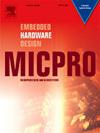为空间应用中基于sram的fpga和存储器提供经济高效的容错EDAC解决方案
IF 2.6
4区 计算机科学
Q3 COMPUTER SCIENCE, HARDWARE & ARCHITECTURE
引用次数: 0
摘要
空间存储器和现场可编程门阵列(FPGA)器件的可靠性受到辐射暴露引起的单事件干扰(seu)的显著挑战。为了减轻这种情况,通常使用汉明(12,8)码和三模冗余(TMR)等传统方法。TMR包括三倍存储器或FPGA设备,并使用投票逻辑来检测和纠正错误位,提供防御辐射引起的干扰。然而,这种方法在资源利用和功耗方面的成本很高。本文提出了一种结合部分TMR和准循环(QC)码的错误检测与校正(EDAC)系统,以增强对存储器和基于sram的fpga的保护。该系统选择性地将部分TMR应用于关键设计组件,减少开销,同时确保强大的SEU保护。QC代码进一步提高了内存纠错能力,同时最小化了与TMR相关的开销。实验结果表明,所提出的EDAC系统优于传统方法,在延迟、面积和功耗方面都有显著的降低。这种方法为空间应用提供了一种更高效、更经济的解决方案,确保了低地球极轨道上FPGA和存储设备的更好可靠性。本文章由计算机程序翻译,如有差异,请以英文原文为准。
A cost-effective fault-tolerant EDAC solution for SRAM-based FPGAs and memory in space applications
The reliability of memory and Field Programmable Gate Array (FPGA) devices in space is significantly challenged by Single Event Upsets (SEUs) caused by radiation exposure. To mitigate this, traditional methods such as Hamming (12, 8) codes and Triple Modular Redundancy (TMR) are commonly used. TMR involves triplicating memory or FPGA devices and using a voting logic to detect and correct erroneous bits, offering defense against radiation-induced upsets. However, this approach comes at a high cost in terms of resource utilization and power consumption. This paper presents a novel Error Detection and Correction (EDAC) system that combines partial TMR and Quasi-cyclic (QC) codes to enhance the protection of memory and SRAM-based FPGAs. The system selectively applies partial TMR to critical design components, reducing overhead while ensuring robust SEU protection. QC codes further improve memory error correction capabilities while minimizing the overhead associated with TMR. Experimental results demonstrate that the proposed EDAC system outperforms traditional methods, offering notable reductions in delay, area, and power consumption. This approach provides a more efficient and cost-effective solution for space applications, ensuring better reliability of FPGA and memory devices in low-Earth polar orbits.
求助全文
通过发布文献求助,成功后即可免费获取论文全文。
去求助
来源期刊

Microprocessors and Microsystems
工程技术-工程:电子与电气
CiteScore
6.90
自引率
3.80%
发文量
204
审稿时长
172 days
期刊介绍:
Microprocessors and Microsystems: Embedded Hardware Design (MICPRO) is a journal covering all design and architectural aspects related to embedded systems hardware. This includes different embedded system hardware platforms ranging from custom hardware via reconfigurable systems and application specific processors to general purpose embedded processors. Special emphasis is put on novel complex embedded architectures, such as systems on chip (SoC), systems on a programmable/reconfigurable chip (SoPC) and multi-processor systems on a chip (MPSoC), as well as, their memory and communication methods and structures, such as network-on-chip (NoC).
Design automation of such systems including methodologies, techniques, flows and tools for their design, as well as, novel designs of hardware components fall within the scope of this journal. Novel cyber-physical applications that use embedded systems are also central in this journal. While software is not in the main focus of this journal, methods of hardware/software co-design, as well as, application restructuring and mapping to embedded hardware platforms, that consider interplay between software and hardware components with emphasis on hardware, are also in the journal scope.
 求助内容:
求助内容: 应助结果提醒方式:
应助结果提醒方式:


